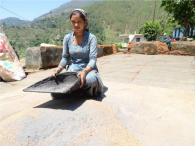The sole occupations of people in Uttarakhand State are farming and animal husbandry. Much of the land is hilly terrain which is totally dependent on rains hence in the past few years, climate change has had a deep and adverse effect on farming practices in the state. Some of these changes are cloud bursts, hailstorm, no rainfall for long periods, unseasonal rainfall, excess snowfall during winter, and inadequate rainfall. Because of these, farmers are facing many challenges including loss of fruit due to tremors and hailstorm, crops being destroyed, continuous fall in production, irregular crop cycle, dying trees, and nil produce of certain crops. All these are directly affecting the livelihood of farmers.
As one cannot visualize life without agriculture, farmers are experimenting with innovative techniques at the local level to combat the negative effects of climate change. Some of these practices include selecting weather-friendly crops like those which grow swiftly or require less water, ensuring reduction of wastage of crop, not harming the environment, controlling weeds, protecting moisture, mulching, covering the crop with a canopy, tying a knot in order to increase the production of specific crops, deploying a cloth thread or string instead of a wooden stick for creeper plants, turning to organic pesticides to control plant diseases and pests, implementing traditional methods of seed storage, moving towards growing medicinal crops, encouraging new plant breeds, focusing on demand-based production, land consolidation, following the crop cycle, and protecting crops from wild animals.
INHERE identifies relevant innovative techniques for farmers and then captures their application and the results through video documentation. Meetings, workshops, and awareness sessions are organized to share these best practices among the farmer community.
INHERE also intensively researches agricultural innovations (with national and international organizations, NGOs, universities) such as modern farming techniques, innovative experiments, machines and tools and equipment, and certified seeds. Thereafter, these innovations are customized according to the geographical situation and implemented on a trial basis at scientific labs. Upon observing positive results these practices are demonstrated at the rural level and only after these innovations bring in a good result are they disseminated at the community level. Some of these practices include line sowing, SRI, intercropping, deploying nets to protect fruits, and organic pesticide.
Farmers are provided with educational and skills-based training. Modern and useful tools and machines are made available and exhibited in villages. Changes suggested by farmers are incorporated and then given to the farmers for a practical demonstration. After getting positive results, these tools are provided to the farmers based on their requirement to support them in their livelihood. Some of these tools are spade, garden rake, hand rake, sickle, hoe, line maker, drill machine, thresher, paddy thresher, power tiller, cutter, and flour mill which cuts down on the time and labor of the farmers and increase their efficiency and production.
To fight water scarcity modern techniques like a sprinkler, drip, rainwater harvesting tanks, LDP tanks are exhibited at the village level and their importance and methodology are demonstrated. Thereafter, these are also made readily available to the farmer community.
Meetings, awareness sessions, training programs, and workshops are regularly organized to encourage farmers to accept these successful innovations and to provide a platform for the exchange of best learning practices. The objective is to ensure that maximum benefit is reaped from agriculture; investment, time, and labor is radically reduced; and livelihoods are improved.
Dedicated to sustainable development in the Himalayan mountain region–its people, environment and economy, the Institute of Himalayan Environmental Research and Education (INHERE) focuses on conservation and sustainable use of natural resources, diverse safe and nutritious food, sustainable rural livelihoods, water and sanitation and above all community empowerment. INHERE is one of the farmers’ organizations that are part of MTCP2 India. #













Comments are closed